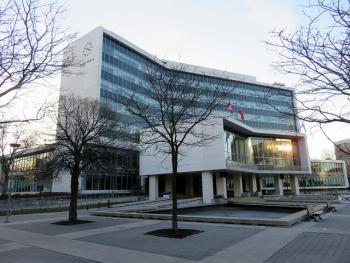Like this article? rabble is reader-supported journalism. Chip in to keep stories like these coming.
There's an old saying: all politics is local.
And you can't get much more local than a byelection for a city council seat.
Sure, it doesn't have the panache, media attention or big spending of a national or a provincial campaign, but the Ward 7 byelection in Hamilton, Ontario has generated a lot of attention in the Hammer.
For one thing, a record 22 candidates have stepped up and put their name forward for the city council seat vacated when the sitting councillor was elected to Parliament last October.
Even more interesting are the issues candidates are talking about at the doors and at forums.
According to Hamilton Community News, most candidates are supporting a living wage for the City.
Hamilton City Council will be debating whether to make Hamilton a living wage municipality later this spring and it seems many Ward 7 candidates are making the living wage a key part of their platforms.
Hamilton's living wage was first calculated in 2011 by the Social Planning & Research Council of Hamilton in collaboration with the Canadian Centre for Policy Alternatives.
There are 30,000 people in Hamilton who work but do not earn enough to pull themselves or their families out of poverty. A coalition of community groups came together as Living Wage Hamilton to address working poverty and encourage local employers to pay their workers Hamilton's living wage of $14.95.
Hamilton's public school board, Chamber of Commerce and some of the community's largest not-for-profit organizations are among the 30 employers that have signed living wage declarations in Hamilton.
Living wage advocates hope the City of Hamilton will be the next big champion. In late 2015, the City of Cambridge became the first Ontario municipality to commit to paying its staff a living wage.
Uzma Qureshi, a candidate for council in the Ward 7 race, believes it's critical the City of Hamilton lead by example and implement a living wage for municipal employees and contract staff.
Candidate Geraldine McMullen endorsed the concept of living wage in her election brochure: "I am a "living wage" supporter -- this concept can increase the standard of living allowing many Ward 7 citizens to participate fully in our community."
Damin Starr isn't just a candidate in Ward 7; he also runs a small business in neighbouring Niagara region. He pays his staff a living wage and believes others should as well.
"My wife and I are supporters of living wage by doing, not just talking," Starr says.*
He says paying a living wage is one of the best decisions they've made: "We don't have employee turnover like we used to, our productivity is doubled."
Before running for the open city council seat, former broadcaster Doug Farraway worked with a local food bank, Neighbour to Neighbour, one of Hamilton's non-profit living wage employers. On the City of Hamilton becoming a living wage employer, Farraway said: "It's long past time to make it happen."*
Donna Skelly, a former CHCH-TV host and a candidate for the Progressive Conservatives in the last provincial election, is also running in the Ward 7 municipal byelection. She stated at a recent forum that Hamilton is "ready for honest conversation to start implementing a living wage." Skelly says five years ago, "the community wasn't ready for the conversation."*
If Ward 7 in Hamilton is a microcosm of political discourse, the living wage movement seems to be gaining an impressive foothold. The sky may be the limit.
Tom Cooper is director of the Hamilton Poverty Reduction Roundtable and coordinator of the Ontario Living Wage Network, with which the CCPA-Ontario is a proud partner. Follow him on Twitter @TomCoopster.
*Direct quotes thanks to The Public Record by Joey Coleman.
Photo: Sean_Marshall/flickr
Like this article? rabble is reader-supported journalism. Chip in to keep stories like these coming.




Comments
Do
Don't